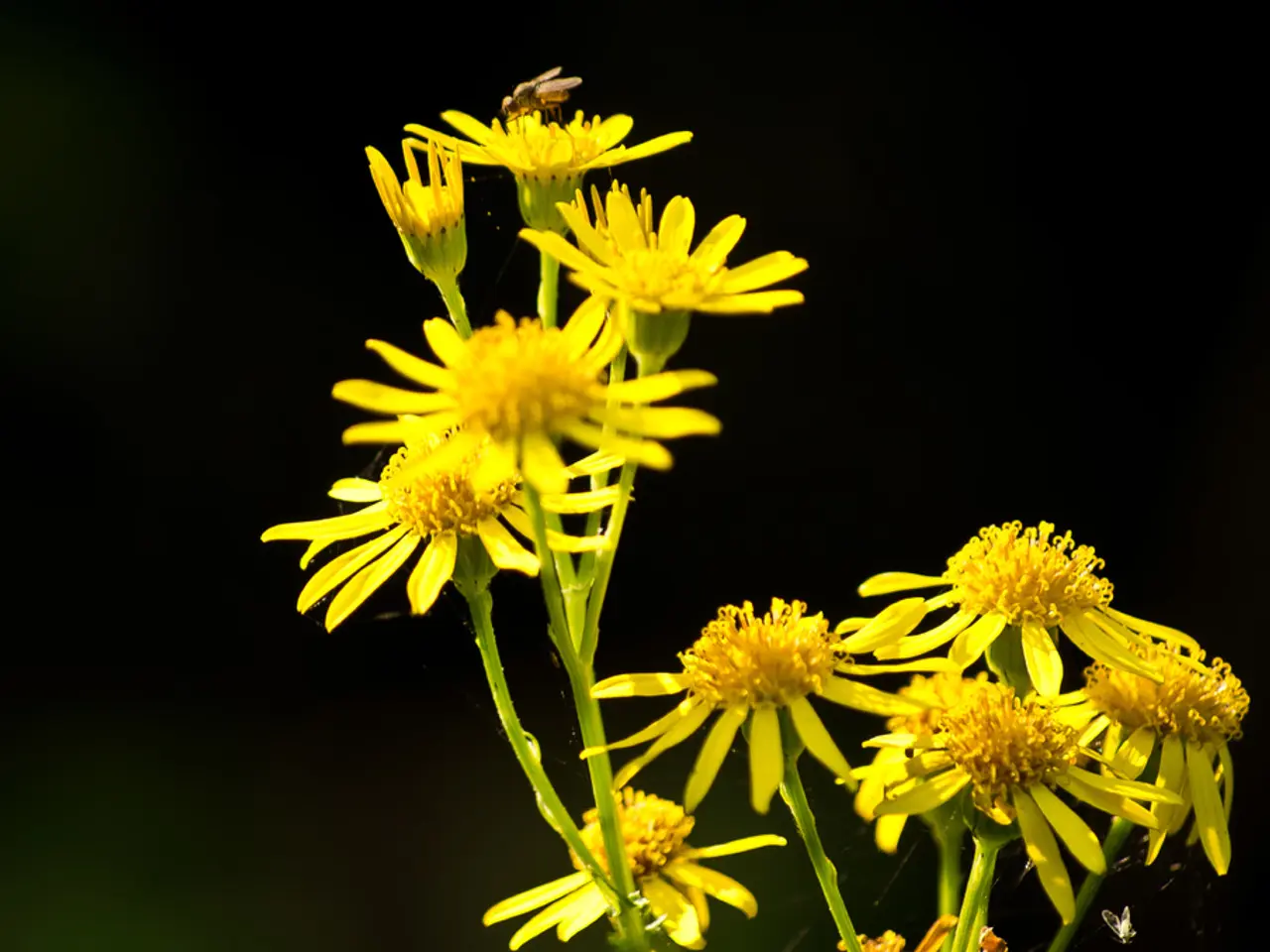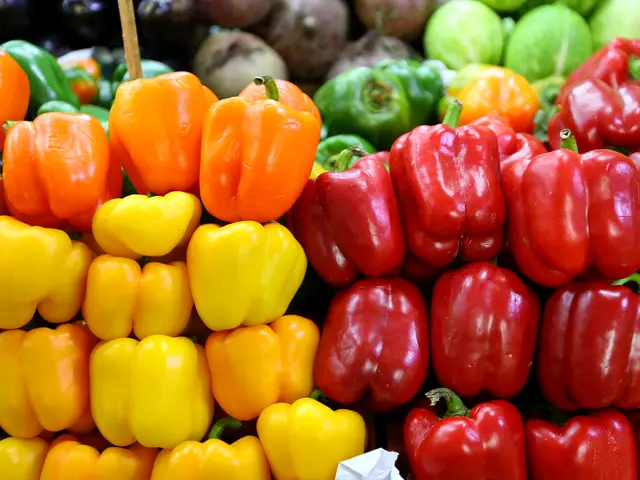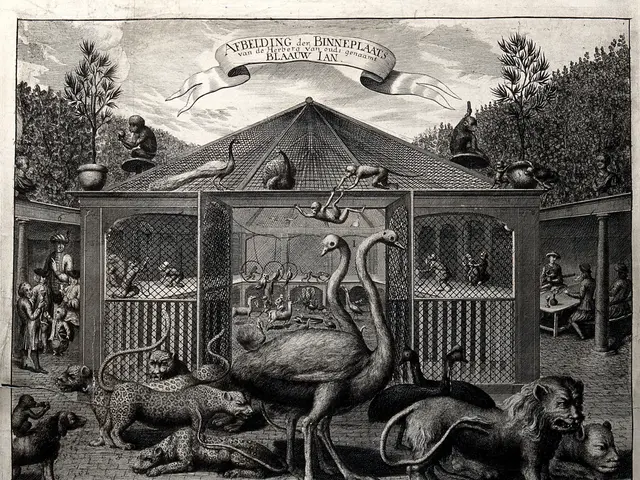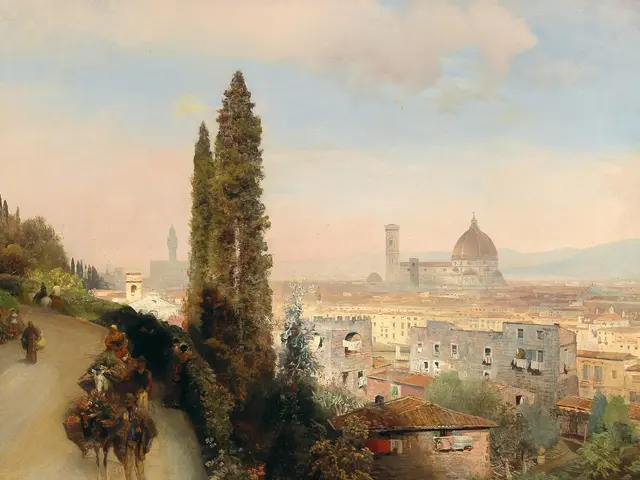Thirteen Charming Perennial Blooms that Attract Honeybees
In a garden that's buzzing with life, there's a symphony of colours and scents that attracts more than just the human eye. With a focus on perennials, this guide will help you create a bee-friendly haven that provides nectar and pollen throughout the growing season.
Globe Thistle (Echinops ritro) and Purple Coneflowers (Echinacea spp.) are irresistible to bees and birds. Their purple globe-like flower heads are a favourite among various varieties of bees and butterflies throughout the blooming season.
Rudbeckias (Rudbeckia spp.) with their single flowers offer an easy navigation for bees, providing them with much-needed pollen. Meanwhile, Dahlias (Dahlia spp.) are a bee-friendly choice, but only in USDA Hardiness Zone 8 or warmer climates, as they are not perennials elsewhere.
Perennial herbs like Angelica, Chives, Comfrey, Fennel, Hyssop, Lavender, Lovage, Mint, Oregano, Rosemary, and Sage can attract bees to the garden. These herbs not only add flavour to your meals but also contribute to a thriving bee population.
Common Daisy (Bellis perennis) is a reliable bee attractor for the summer garden, while Bee Balm (Monarda spp.) attracts honeybees and bumblebees alike, also drawing in hummingbirds and beneficial insects.
Anise Hyssop (Agastache foeniculum) is a native plant that attracts both honeybees, carpenter bees, and bumblebees, as well as hummingbirds, butterflies, and night-flying moths.
Goldenrod (Solidago spp.) blooms from late summer into the fall and survives winters in USDA Hardiness Zones 3 through 9. This hardy plant is a favourite among bees and hummingbirds.
Plants that remain alive in winter and are especially interesting for honeybees include early bloomers like crocuses, which provide crucial nectar and pollen in early spring, supporting honeybee colonies. Winter-flowering shrubs like Edgeworthia grandiflora (Japanese paper bush) bloom in winter and can attract bees. Some winter-hardy plants such as Lobularia (sweet alyssum) and Bidens (tickseed) are also valuable for bees in colder seasons.
Stone fruits like peaches, apricots, and cherries attract bees in early spring and support beneficial insects throughout the summer. Willows and native buckthorns provide pollen and nectar for bees and homes for beneficial insects like assassin bugs, soldier beetles, hoverfly larvae, and parasitic wasps.
Blueberries have a special relationship with bumblebees, providing pollen and nectar for them and ensuring larger fruit. However, it's crucial to avoid plants like Azaleas and rhododendrons, as their pollen can be poisonous to bees, pets, and people.
Honeysuckle (Lonicera spp.) has sweet nectar that is a favourite food of bees, butterflies, moths, hummingbirds, and children. However, be cautious with certain species of lime trees, as their pollen has a narcotic effect on bees, leaving them vulnerable to predators.
Joe Pye Weed (Eutrochium dubium) is a 6-foot tall fall bloomer that is a favourite of both bees and hummingbirds. Bellflowers (Campanula spp.) are late-spring bloomers that are attractive to both honeybees and solitary bees like bumblebees and carpenter bees.
Hardy Geranium (Geranium spp.) can feed bees all year round if protected from temperatures below 45° F (8° C). This versatile plant adds a splash of colour to your garden while providing sustenance for our hardworking pollinators.
By planting one or more blooming perennials in your bee garden for every season of the year, you can ensure a constant supply of pollen and nectar, creating a diverse and thriving ecosystem that benefits both you and the bees. A diversity of perennial flowers ensures a variety of bees, including domesticated honeybees, wild honeybees, and solitary bees like bumblebees and carpenter bees.
Remember, while weeds attract more pests than bees, they should be removed from any bee-friendly garden. By creating a bee-friendly garden, you're not only contributing to the survival of these important pollinators but also creating a more beautiful and vibrant outdoor space for everyone to enjoy.








